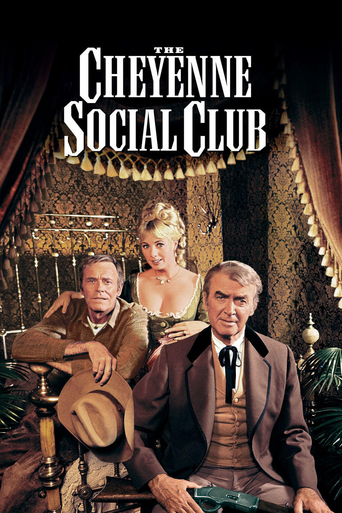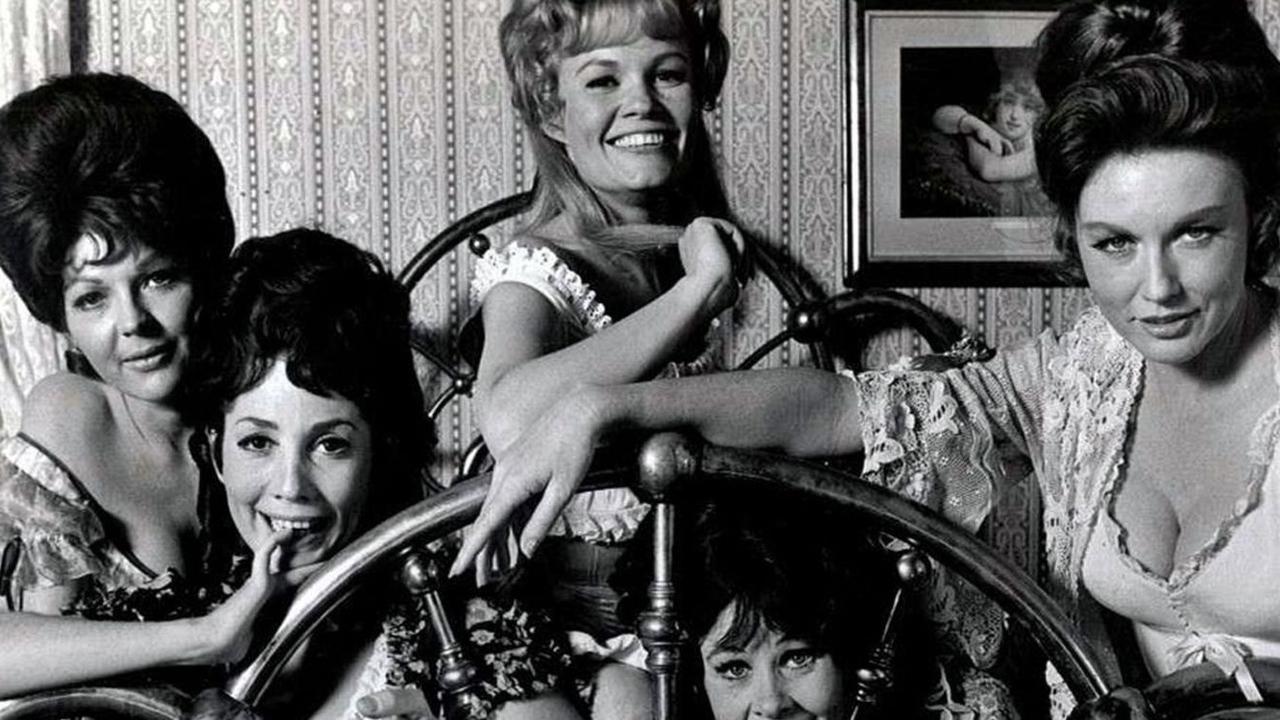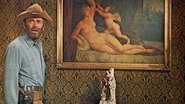mmallon4
The Cheyenne Social Club sounds like a bad idea on a number of levels. For beginners it stars two elderly actors towards the end of their careers in a comedy about prostitution, not to mention Gene Kelly would be one of the last people I would expect to be directing a western. For a long time it remained a movie I doubt I would ever watch yet much to my surprise the film turned out not only to be perfectly dignified but also very funny and surprising endearing. The idea of Jimmy Stewart being the owner of a brothel and becoming a sugar daddy sounds wrong on paper yet somehow it manages to work. The Cheyenne Social Club paints an idealized version of a whore house in which the women are proud of their profession and worship their boss. The movie doesn't shun prostitution and while propaganda might be a strong word I certainly got the impression the movie was voicing its support for the legalisation of prostitution.Henry Fonda is by far the funniest thing in the film; a child in an adult's body living out a completely carefree existence with Stewart being the straight man and the grown up one of the two. Even as soon as the film begins Fonda babbles through the entire opening credits which according to the movie lasts for literally over a thousand miles which helps distract from how ordinarily plain the test in the opening credits are. The relationship between the two is incredibly endearing with one of my favourite moments of the film is the two of them innocently sleeping in the same bed together. It is also very amusing as Fonda just follows Stewart wherever he goes as he has nothing else to do with his time but also because he just likes his company. It's evident through their own screen chemistry that the two where lifelong friends. The film's other major highlight is Stewart and Fonda's discussing of politics (Stewart being a Republican and Fonda a Democrat) mirroring their real life personas and bringing to mind an occasion when their friendship was almost brought to an end when they got engaged in a fist fight over politics in 1947 ("I don't like to dispute you John but didn't you always vote democratic?, Well...that was when I didn't know any better") .The Cheyenne Social Club is the third of three films James Stewart and Henry Fonda starred in together. The first two of which are among the weakest films I've seen from ether actor. Thankfully the third time was the charm; it took 35 years to get these two legendary actors in a great film together but it was worth the wait.
berberian00-276-69085
I wish to add this slice of information on actor Jimmy Steward because of several reasons - a/ since some critics allude to the fact that there was not enough manhood in him to be film hero, he rather looked like a University associate or even Nobel laureate with his intelligent face; b/ because Western cinema is synonymous with American cinema which is not perceived well by some activists in Europe that still hang to their national film industry; and, also for some other reasons ... Now filmography entries for James Steward are quite substantial and given elsewhere, we can't make easy choices about his almost 100 feature films and long life-span of 90 years (plus-minus the professional attrition). He was also Brigadier General with US Air Force, a rare privilege for Hollywood star, etc.Let's look at his Oscar winning performance in "The Philadelphia Story" (1940). Steward established himself as actor very quickly in the 1930s and while unexpectedly for some this seems quite logical for me because he is both whimsical and eloquent. His English speech comes like a music and is specially impressive for foreigners with customary hearing. Then I should say that his acting, while no acting classes taken, imply an inborn snobbishness that is characteristic for classics such as William Thackeray heroes. What else to say, besides the fact that his play was highly appreciated by Hollywood directors Frank Capra, Alfred Hitchcock, John Ford and others, also his versatility should be remembered with women whom he partnered as real gentleman. Partly true, his counterpart in this film Katharine Hepburn which holds all times record for women (4 Oscars) was seldom tempted to lie - as all women love to do. She said that she didn't suffer from Parkinson disease while she did so in a mild form. Her intentional head tremor is evident in "Rooster Cogburn" (1975) and as late as "Grace Quigley" (1984) she remained on stage with no serious mental disturbances.On "Cheyenne Social Club" (1970) I should retort his gunman abilities at age 62. His friendship with Henry Fonda was remarkable, much unappreciated I think. Both enjoyed their film popularity because of their non-traditional, so to say, congenital sophisticated manners that is difficult to imitate. Such people are not easy to lure in cinema now-a-days. I don't want to say that cinema today is poor but it just have other values.Last word on manhood of the actors. I am not a specialist but before cinema was invented 100 years ago there was something else that made people popular in the societal aspect. And I don't speak here of theater because the latter is nothing without technicality. So I speak here of the science of Physiognomy which has roots largely in the past times and history can give best examples. Lastly this science have been equaled with Eugenics that was banned by official authorities in the 20th centuries. However, many truths remain written on the face of living people. After all "Greek Fire" was invented before Gunpowder and thus allowed the conquest of the New World. Thank you!
bsmith5552
"The Cheyenne Social Club" is a delightful easy going comedy western produced and directed by screen legend Gene Kelly. Given the subject matter, Kelly manages to stick handle around the double entendres and present a comedy that is tastefully done and probably offended no one.Two drifters, John O'Hanlan (James Stewart) and Harley Sullivan (Henry Fonda) are working cattle in Texas. One day O'Hanlan receives a letter informing him that he has inherited some property in Cheyenne, Wyoming. So he and Harley set out for Cheyenne.When they arrive, they discover that the property that O'Hanlan has inherits is a bawdy house known as The Cheyenne Social Club. They meet the "Madame", Jennie (Shirley Jones) and the rest of the girls, Opal Ann (Sue Ann Langdon), Pauline (Elaine Divry), Carrie Virginia (Jackie Russell), Annie Jo (Jackie Joseph) and Sara Jean (Sharon DeBord).O'Hanlan at first is hailed as a saviour by the townsfolk. He is given carte blanche at the local saloon by the Barkeep (Robert Middleton) and becomes the most popular man in town. Harley meanwhile has struck up a friendship with another saloon girl Alice (Jean Willes) after he stops her runaway horse.O'Hanlan is uncomfortable with the kind of business he's in and announces that he is closing up the Social Club while he ponders his next move. Well, the townsfolk don't take too kindly to this and turn against him. In particular he runs afoul of bully Corey Bannister (Robert J. Wilke).When Jennie is beat up by Bannister, O'Hanlan comes to her aid. With some unexpected help from Harley, he manages to gun down Bannister. The local Marshal (Arch Johnson) warns O'Hanlon that Bannister's relatives will surely come after him. Harley decides to return to Texas. On the trail he meets the Bannisters led by "Uncle" Charlie (Charles Tyner) who are heading to Cheyenne.Only O'Hanlon is left to defend the Social Club and its girls. But then........................Stewart and Fonda had been friends since the 1930s and play well off of each other. As a contrast, takes a look at "Firecreek" which they made two years earlier for two completely different performances. Both had done light comedy before so were able to play these roles convincingly. They even get to "sing" a song on the trail (good thing they didn't quit their day jobs).The film is made even better with its fine supporting cast. In addition to those already mentioned there is Dabbs Greer as Lawyer Willowby, J.Pat O'Malley as a fast talking drummer and John Dehner, Jason Wingreen, Myron Healey and Hal Baylor in other roles.Great entertainment.
Nazi_Fighter_David
After an interminable journey across the plains, two itinerant cowboys (the two Hollywood legend Stewart and Fonda) reach Cheyenne, where Stewart has inherited the noisiest bordello in town, which is well-managed by pretty Shirley Jones... From this moment, the two friends run into assorted problems with the townspeople, specially when one of them kills a guy who has beaten Jones
The murdered man's family becomes an implacable enemy... Shot on location near Santa Fe, New Mexico, the film is neither good nor bad, entitled neither as farce nor Western
Some of the jokes about the bordello are labored and repetitious, and there was some complaint over Stewart compromising his clean cut image when he confronts one of the prostitutes in a see-through negligée
Stewart wanted the scene cut out, but the company overruled him
The film's director was a surprising choice
Stewart's reasons for wanting to use Gene Kelly, whose reputation was scarcely associated with Westerns, remain obscure
Perhaps he felt Kelly would sly1y inject more tongue-in-cheek elements, given the bordello angle, than an action-oriented director like Andrew, McLaglen would have
Fonda seems to have had a solid affection for "The Cheyenne Social Club," especially as it gave him and Stewart a chance to really co-star in a movie with some human dimensions...



 AD
AD





